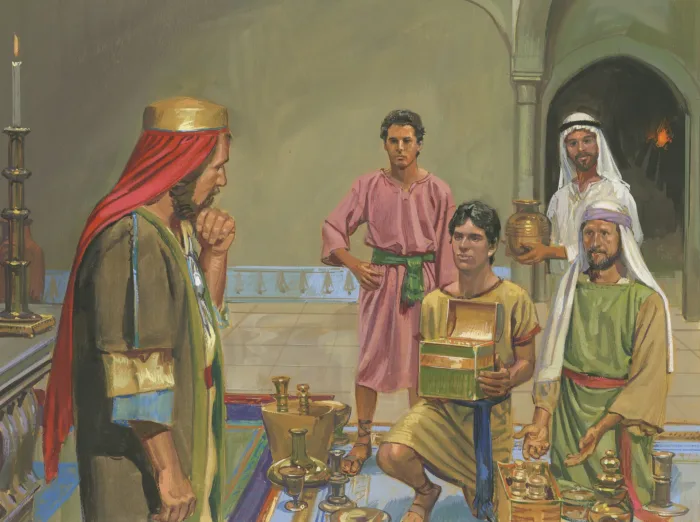The most memorized Christian scripture is without a doubt “Jesus wept.” (John 11.35). A very close second, at least among members of the Church, is “And my father dwelt in a tent” (1 Nephi 2.15). While it’s a convenient scripture to memorize, it raises an interesting question: why did Nephi feel the need to include this detail as he was looking back on his experiences and writing this record after so many years?
Sacrifices
A commonly cited answer is that Nephi wanted to show the sacrifices that his family had made when they left Jerusalem. We don’t know Lehi’s profession, but we do know that he was rather educated, having known “the learning of the Jews and the language of the Egyptians” (1 Nephi 1.2). His family also had enough wealth that Nephi and his brothers thought to use the “gold and silver, and all manner of riches” (1 Nephi 3.16) to purchase the brass plates from Laban.

By noting that Lehi “dwelt in a tent”, Nephi may have been highlighting the dramatic change in lifestyle and status his family experienced in leaving their comfortable home in Jerusalem. This argument is compelling and surely holds truth. However, if there’s anything we can learn about the scriptures, it’s that the Lord is never content to let a story only have a single layer of meaning.
Feast of Tabernacles
While the sacrifices Lehi’s family made are certainly important, there may be an even deeper significance to Nephi’s mention of his father dwelling in a tent. We often read these stories through a modern-day lens, which can cause us to miss some elements that would’ve been much more apparent to Nephi and his kin. Let’s take a look at Lehi dwelling in a tent from the frame of reference of a faithful Jew in Jerusalem, and some interesting points will begin to emerge.
In Leviticus, The Lord commands the Israelites to celebrate various feasts throughout the year. We’ll focus on the three fall feasts that were celebrated during the harvest season.
The first feast, the Feast of Trumpets, calls all Israelites to repentance. Lehi’s story begins when he hears prophets crying repentance unto the people in Jerusalem, after which he begins to do so as well.
The second feast, the Feast of Atonement, calls for a blood sacrifice. A scapegoat is also released into the wilderness (see Leviticus 16.21-22). We know that there were many contemporaneous prophets preaching in Jerusalem, including Jeremiah, Obadiah, and Zephaniah. Jeremiah survived the Babylonian conquest, but we do not know the fates of the other prophets. We do know however, that the Jews attempted to kill Lehi for calling them to repentance. The blood of other prophets may have been spilled, but Lehi was sent into the wilderness by the Lord.
One of the most important events was (and still is) the Feast of Tabernacles, the last of the three fall feasts. The Jews gathered together at Jerusalem and constructed booths, or tents, where they would dwell for the duration of the event. God commanded the Israelites to begin celebrating the Feast of Tabernacles in Leviticus 23 after He freed them from bondage in Egypt. This event was a celebration of God caring for them in the wilderness, and served as a reminder to Israel of all that God had done for them.
While Lehi may not have erected his tent in the wilderness with the express purpose of celebrating the Feast of Tabernacles, the purpose fits nicely with his experience.[1] God led Lehi and his family out of Jerusalem and away from the captivity that awaited the Jews when Babylon arrived to destroy Jerusalem.
Lehi is able to rejoice in the Lord despite his hardships because he is so sure of the future blessings that await him. We see Lehi manifest this attitude multiple times: after seeing the destruction that will befall Jerusalem when he has his first vision, he praises God for his goodness and mercy (1 Nephi 1.14). He also tells his wife Sariah, “I have obtained a land of promise” (1 Nephi 5.5), even when they were still in the wilderness, barely beginning their journey (take a look at the Hebrew prophetic perfect tense for a deeper dive here!).
Conclusion
We’ve explored two potential reasons why Nephi may have included the detail about his father Lehi dwelling in a tent - the sacrifices his family made in leaving Jerusalem, as well as the connection to the Feast of Tabernacles and God’s deliverance of His people. Regardless of the specific reason, Nephi’s inclusion of this detail invites us to strive for the same faith and gratitude that Lehi demonstrated, even in the midst of hardship.
Let us emulate Lehi’s attitude of praising God, even when we are in the depths of our struggles. God has done such great and marvelous things for those who have come before; will He not do the same and deliver us as well?
While we do not know the exact timing of when Lehi and his family left Jerusalem, we do know that they see a river of water (1 Nephi 2.6). Given the fact that these rivers in the desert are not permanent, this could hint that they were traveling during the rainy season, when the Feast of Tabernacles is celebrated. Highly circumstantial, but interesting to note 🙂 ↩︎